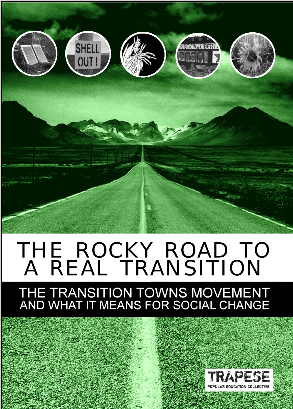Transition Culture has moved
I no longer blog on this site. You can now find me, my general blogs, and the work I am doing researching my forthcoming book on imagination, on my new blog.
Come find me at robhopkins.net
Archive for “Resilience” category
Showing results 381 - 385 of 401 for the category: Resilience.
3 Jun 2008

Using Natural Finishes: lime and earth-based plasters, renders and paints. A step-by-step guide. Adam Weismann and Katy Bryce. Green Books. 2008.
The first book on natural building I ever read was Becky Bee’s book ‘The Cob Builder’s Handbook‘. What was so refreshing about it was that it was a building book written by a woman, and it was as intuitive and accessible as it was technical, and much of it read like a cookbook in its descriptions of the materials. This same spirit has gone on to pervade the growing natural building movement, a playful, intuitive and inspired rethinking of the creation of shelter that does much more than just keep the rain off.
Read more»
28 May 2008
 Quite suddenly and almost by accident, a wholly new political movement has exploded upon the scene. It erupted in Totnes, an ancient town on Devon’s River Dart of only 7,500 inhabitants. Scarcely two years ago, a small group of its citizens took note of the announcement that the global supply of oil had ‘peaked’, (meaning that against a rapidly expanding demand for a resource which has been the basis of industrial development and economic expansion for at least 150 years, the supply would sooner or not much later run out or become unaffordable). So did a lot of other people of course, but the Totnes group were unique in deciding to do something about it. They realised that what was at stake was an urgent need to change an entire lifestyle, currently based on the availability of oil, to one based on local resources.
Quite suddenly and almost by accident, a wholly new political movement has exploded upon the scene. It erupted in Totnes, an ancient town on Devon’s River Dart of only 7,500 inhabitants. Scarcely two years ago, a small group of its citizens took note of the announcement that the global supply of oil had ‘peaked’, (meaning that against a rapidly expanding demand for a resource which has been the basis of industrial development and economic expansion for at least 150 years, the supply would sooner or not much later run out or become unaffordable). So did a lot of other people of course, but the Totnes group were unique in deciding to do something about it. They realised that what was at stake was an urgent need to change an entire lifestyle, currently based on the availability of oil, to one based on local resources.
Read more»
22 May 2008
 On Wednesday night, on the same night as the rather wonderful Champions League Final (which some idiot timetabled for the same night.. oops it was me… doh) and on the evening oil began touching $135 a barrel, Transition Town Totnes held an evening called “How Are We Doing?”, an opportunity for TTT to update the community on how it is doing, and on all the range of activities and projects underway, as well as getting feedback. In the event over 100 people came, and the evening was very positive and constructive.
On Wednesday night, on the same night as the rather wonderful Champions League Final (which some idiot timetabled for the same night.. oops it was me… doh) and on the evening oil began touching $135 a barrel, Transition Town Totnes held an evening called “How Are We Doing?”, an opportunity for TTT to update the community on how it is doing, and on all the range of activities and projects underway, as well as getting feedback. In the event over 100 people came, and the evening was very positive and constructive.
Read more»
20 May 2008
 With the oil price looking pretty settled at $126 a barrel having reached as high in recent days as $128, what does the UK Government estimate the future oil price to be? Clearly one would imagine that as the most responsible body in the land, charged with making long term decisions that affect us all, they would have their fingers on the pulse of this one. Unfortunately the official position is as insulting as it is pathetic.
With the oil price looking pretty settled at $126 a barrel having reached as high in recent days as $128, what does the UK Government estimate the future oil price to be? Clearly one would imagine that as the most responsible body in the land, charged with making long term decisions that affect us all, they would have their fingers on the pulse of this one. Unfortunately the official position is as insulting as it is pathetic.
Read more»
15 May 2008
 The Rocky Road to a Real Transition: the transition towns movement and what it means for social change. Paul Chatterton & Alice Cutler. The Trapese Collective. A free download available here (warning: it is a huge file): 2008. 41pp.
The Rocky Road to a Real Transition: the transition towns movement and what it means for social change. Paul Chatterton & Alice Cutler. The Trapese Collective. A free download available here (warning: it is a huge file): 2008. 41pp.
It is flattering that so early in a movement such as the Transition movement, people take the time to sit down and write such a detailed critique of it. Trapese Popular Education Collective were previously behind the excellent ‘Do It Yourself Manual’. As the first published external examination of the Transition model it is to be welcomed, and the authors raise a number of important questions. From my perspective, “The Rocky Road…” does a very good job of identifying many of the key areas where Transition is distinctly different from other approaches to social activism.
Read more»






